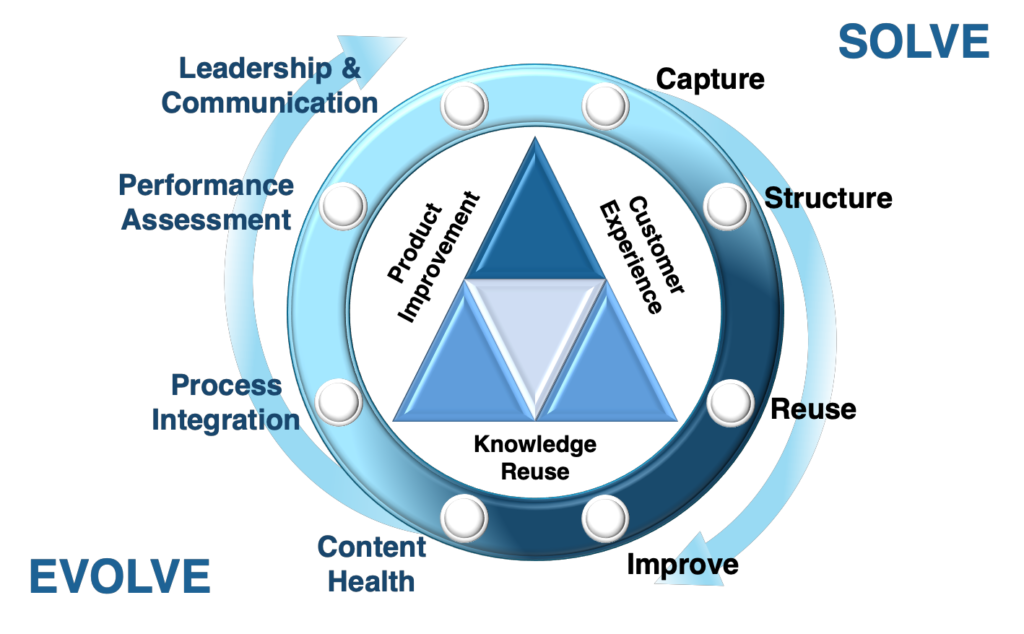Knowledge-Centered Service (KCS) is the industry best practice for knowledge management. The members of the Consortium for Service Innovation have been developing it since 1994. While it was originally designed for technical support organizations, KCS also creates value for other organizations. IT Service Management (ITSM), Human Resources (HR), customer service, professional services, and presales organizations benefit. KCS applies anywhere people are asked and answer questions.
What’s Different about KCS?
What KCS v6 does differently than other KM practices is to integrate knowledge into the job. When a knowledge worker tackles an issue or question, they first search the knowledge base. If they find their answer, they tell the system that they reused the article they found. This means they don’t have to re-solve the issue….the article already holds the answer their customer needs! Over time, the most-reused articles show the organization the biggest opportunities for improvement.
If the article they find should be expanded or updated, the knowledge worker will do it right then and there.
When there is no relevant article, the knowledge worker will capture a new article as they work through the issue or question. Many people answering questions keep track of their interactions whether in a case, incident, ticket, or even email. If people take these notes in a simple, structured way, when the question gets answered, the new article is mostly written. Over time, this fills any gaps in the knowledge base.
Knowledge-Centered Service makes another departure from traditional KM: it eliminates review queues. This substantially streamlines KM.
Building Quality Into the Process
To get rid of review queues, we need a different way to assure quality. KCS uses five interlocking approaches:
- The most important thing is to make every use a review. If an article you’re attempting to use is out of date, not specific enough, or simply wrong, you’ll learn this by trying to use it and fixes it. The more knowledge workers use an article, they more they review it. Articles that aren’t reused aren’t reviewed. It’s a simple and elegant allocation of effort.
- The Content Standard documents how articles are to be written. KCS articles are crisp, highly structured, and about one thing. The Content Standard describes article templates and how to use them. It does this with plenty of good and bad examples.
- Knowledge workers earn the right to self-publish new or edited content by proving they have the necessary skills. Coaches help guide their colleagues to develop these skills to earn their KCS license.
- Coaches perform spot-checks of the articles licensed contributors and publishers write. They ensure knowledge workers keep up the good work. If needed, they offer additional coaching.
- KCS makes knowledge a core part of the job. This means that knowledge workers must create value with the knowledge base to get a good performance rating.
KCS Benefits
KCS is one of the rare things that is good for the business, its customer, and its employees. It
- Speeds answers and resolutions by reusing existing content. If someone in Bangalore solves a problem, someone else in Kansas City doesn’t need to the next time.
- Enables customers with self-service content, which helps them and reduces redundant questions. Articles are easy to find, because the knowledge worker captured what the customer said and the answer they needed.
- Shortens the time required to on-board or cross-train a new team member. Because they have all the organization’s experience at their fingertips, they learn by doing.
- Identifies opportunities for improvement based on the articles that are viewed or reused the most.
What is KCS? Learn More!
The KCS Community is a knowledge-sharing community, so you have lots of opportunities to learn more. A few of our favorites resources are:
- Official KCS Documentation from the Consortium for Service Innovation (CSI). Pay particular attention to the Practices Guide, the Adoption Guide, and KCS Principles and Core Concepts.
- KCS v6 in Five Minutes, a YouTube video
- Customer Service: Knowledge Management, a one-hour KCS course on LinkedIn Learning
- Our blog, which is largely focused on KCS
KCS is a registered trademark of the Consortium for Service Innovation.
